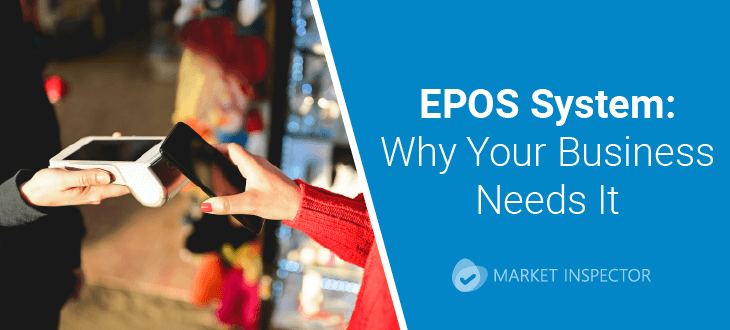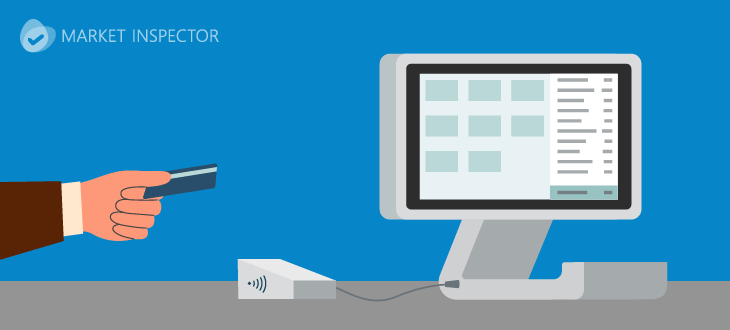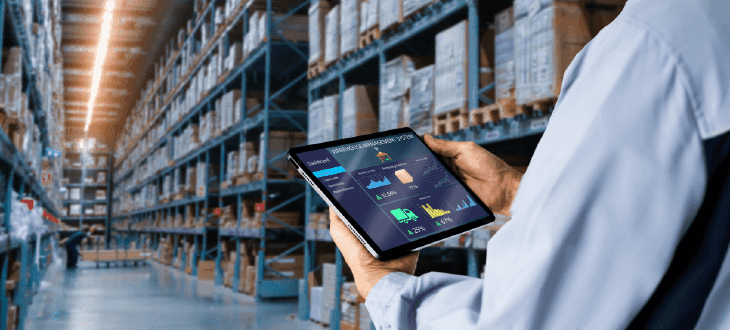Answer these simple questions and we will find you the BEST prices
Which type of solar quotes do you need?
It only takes 30 seconds
100% free with no obligation

Get up to 4 quotes from our selected suppliers by filling in only 1 form

Save money by comparing quotes and choosing the most competitive offer

Our service is 100% free and with no obligation
- Market-Inspector.co.uk
- EPOS Systems
EPOS System: Why Your Business Needs It Today


- An EPOS system is a digital version of a traditional point-of-sale system, such as a cash register. It has advanced features, including processing payments, tracking inventory, generating detailed reports, and supporting customer loyalty programs.
- An EPOS system can cost between £250 and £1,600, depending on the type of hardware and software required, payment processing and the supplier chosen.
- Opting for an EPOS system can save your business time and money by reducing human error and minimising manual labour. The efficiency and minimal error of EPOS systems can also improve customer satisfaction.
In today's dynamic business landscape, embracing an EPOS (Electronic Point of Sale) system is no longer optional but essential for businesses striving to maintain a competitive edge and operational efficiency.
An EPOS system optimises processes by seamlessly integrating sales, inventory management, customer data, and analytics into a unified platform. This cutting-edge technology heightens transaction accuracy and delivers real-time insights to inform intelligent business decisions.
An EPOS system can significantly amplify productivity and profitability by automating repetitive tasks, minimising errors, and elevating customer service. As consumer expectations continue to advance, implementing a robust EPOS system guarantees that your business can adeptly and precisely meet these demands, establishing a solid foundation for enduring success.
To discover the perfect EPOS system tailored to your specific requirements and budget, use Market Inspector to receive four complimentary quotes from experienced suppliers. By obtaining multiple quotes, you can compare various options and features, allowing you to make a well-informed decision that aligns with your operational needs and financial limitations.
This competitive approach ensures you secure the best deal and select an EPOS system that will effectively support and propel your business in today's competitive landscape. Click below to find out more.
- Describe your needs
- Get free quotes
- Choose the best offer
It only takes 30 seconds

Understanding the EPOS meaning

An EPOS system, which stands for Electronic Point of Sale, is a digital solution that replaces traditional cash registers and helps optimise retail and hospitality operations. This advanced software can handle various tasks such as processing payments, tracking inventory, generating detailed reports, and supporting customer loyalty programs.
It comes in various hardware options, such as touchscreen terminal, barcode scanner, card reader, receipt printer and cash drawer. The software of an EPOS system operates digitally, eliminating the need for manual input from employees and provides your business with access to such tasks as:
- Order management: Suitable for hospitality, orders are sent directly to the kitchen or service station, reducing order errors and speeding up service time, ultimately increasing customer satisfaction.
- Stock control: For retail and hospitality, EPOS systems update stock numbers once a sale has been processed, preventing stores from running low on stock and providing data on the most popular items sold.
- Staff management: EPOS systems can also help staff schedule and efficiently manage payroll.
With efficient and streamlined EPOS hardware, customer satisfaction increases. EPOS systems offer multiple payment methods, and according to NMI, around 69% of customers are excited to try new payment technologies. Implementing a new EPOS system in your business can attract customers to make purchases and increase sales.
Different EPOS models, including basic, intermediate, and advanced ones, are available to cater to various budgets and requirements. According to Bark, the average cost of an EPOS system ranges from £250 to £1,600.The price is influenced by hardware, software, EPOS interface, payment processing, required features, and offline capabilities.
Additionally, the supplier of the EPOS system also impacts the overall cost. Implementing an EPOS system can revolutionize your retail or hospitality business by streamlining operations, improving customer satisfaction, and supporting growth. While budget-friendly models are tempting, consider long-term reliability and potential repair costs for better overall value.
Although advanced EPOS models cost more initially, they offer durability and reduce disruptions, ultimately providing better value for your investment. Embracing this technology addresses current market demands and positions your business for future success.
Top 5 EPOS benefits today
Implementing an EPOS (Electronic Point of Sale) system provides many benefits that can revolutionise business operations today. With the advancement in increasingly efficient and fast point-of-sale technology, EPOS systems have become ubiquitous when buying products or services.
While some small businesses use old cash registers, EPOS systems provide significant benefits, especially for front and back office coordination. All in all, an EPOS system, bolstered by its toolkit, has the potential to transform a business's performance significantly. The following sections will go into detail on the top 5 EPOS benefits today for any business.
Improve inventory management

Implementing an EPOS (Electronic Point of Sale) system dramatically improves business inventory management. It provides real-time tracking and automated updates of stock levels. An EPOS system records every transaction instantly, adjusting inventory levels and reducing the risk of overstocking or stockouts.
Real-time inventory visibility helps businesses make informed purchasing decisions, ensuring popular items are available and minimizing excess stock. EPOS systems generate detailed sales reports, seasonal trends, and product performance data, aiding accurate forecasting and strategic planning.
Automating inventory tasks reduces human error and frees staff to focus on customer service and other critical business functions. Overall, EPOS systems streamline inventory management, increase efficiency, and contribute to better financial management and customer satisfaction.
Manage business better using data analytics

EPOS systems enhance business management through powerful data analytics capabilities. These systems collect and analyse transactional data, providing detailed insights into sales trends, customer behaviours, and inventory performance.
EPOS systems identify peak times, top-selling products, and customer preferences, helping businesses tailor marketing strategies and optimize stock levels. This data-driven approach helps make informed decisions, such as optimising product placements, planning promotions, and improving customer loyalty programs.
EPOS analytics identify inefficiencies like slow-moving stock or staff issues, enabling targeted improvements that boost productivity. Comprehensive EPOS data analytics improve forecasting accuracy, resource allocation, and personalized customer experiences, driving profitability and growth.
Improve customer satisfaction

Implementing an EPOS system can significantly improve customer satisfaction by enhancing the shopping experience. EPOS systems streamline checkout, reducing wait times and ensuring quick, accurate transactions, crucial for customer satisfaction. Maintaining real-time inventory data, EPOS systems keep popular items in stock, minimizing stockouts and customer disappointment.
EPOS systems store and analyse purchase histories, enabling personalized promotions and loyalty rewards for better customer service. Enhanced EPOS data analytics help understand customer preferences and behaviour, leading to effective marketing strategies and improved product offerings
Additionally, integrating various payment methods caters to diverse customer preferences, making the shopping experience more convenient. Overall, EPOS systems contribute to a smoother, more personalised, and efficient customer experience, fostering greater loyalty and repeat business.
Boost your customer loyalty programs

Integrating an EPOS system into customer loyalty programs can significantly enhance their effectiveness. EPOS systems track customer purchase history, providing valuable data that enables businesses to design highly targeted and personalised loyalty programs. By analysing buying patterns, companies can offer tailored promotions and rewards that resonate with individual customers, increasing engagement and satisfaction.
EPOS systems streamline the management of loyalty points, discounts, and special offers, making it easier for customers to redeem rewards and stay engaged with the program. This seamless experience fosters a stronger connection to the brand and encourages repeat business.
Real-time data from EPOS systems allow businesses to adapt and refine their loyalty strategies based on trends and customer feedback, ensuring the programs remain relevant and attractive.
Integrating EPOS systems into loyalty programs boosts customer retention and enhances customer experience, driving long-term loyalty and business growth.
Save time and money

EPOS systems help companies save time and money by streamlining operations, reducing manual labour, and minimising errors. These systems automate many routine tasks, such as inventory management, sales tracking, and report generation, significantly cutting down employees' time on these activities. This automation boosts productivity and ensures greater accuracy, thereby reducing costly mistakes associated with manual data entry.
EPOS systems provide data and analytics, enabling businesses to make informed decisions, optimise stock levels, and prevent overstocking or stockouts. Integrating with other business systems, such as accounting and customer relationship management (CRM) software, further enhances operational efficiency by ensuring seamless data flow across different departments.
By improving transaction speed and accuracy, EPOS systems enhance the customer experience, increasing sales and customer loyalty. Investing in an EPOS system can lead to long-term savings and operational improvements, contributing to overall business growth and profitability.
At Market Inspector, we can offer four free, no-obligation quotes from professionals with extensive knowledge of EPOS systems. They will work with you to find the best EPOS system for your business and budget. Click below to learn more.
- Describe your needs
- Get free quotes
- Choose the best offer
It only takes 30 seconds

EPOS till system and additional hardware
An EPOS system simplifies retail and hospitality operations by integrating sales processing, inventory management, customer relationship management, and financial reporting. The EPOS till system generally includes essential hardware such as:

- Touchscreen terminals are a crucial component of an EPOS system. They allow for quick and intuitive interactions between employees and customers. This speeds up transactions by reducing manual input, minimising errors and training time.

- Barcode scanners are devices used to read products' barcodes, ensure accurate product identification and pricing, reduce human errors, and assist inventory management by tracking sales.

- A receipt printer provides customers with proof of purchase. The card reader enables secure processing of various payment methods, including credit, debit, and contactless payments.

- A card reader processes card payments, including credit, debit, and contactless payments. EPOS card readers accommodate the increasing preference for cashless transactions, improving the checkout experience and security.

- An EPOS cash drawer securely stores cash transactions, ensuring accurate cash management.
Additional hardware can include peripherals such as customer display screens, which enhance transparency and trust by displaying transaction details to customers in real-time. Integrated scales can be used for businesses that sell products by weight, ensuring precise billing.
Advanced EPOS systems may also support handheld devices for mobile sales, which are ideal for large stores or restaurants with table service, allowing staff to take orders and process payments on the go. Consolidating hardware into a cohesive system, EPOS tills improve efficiency and enhance customer experience, leading to increased satisfaction and loyalty.
EPOS systems software solutions
EPOS system software solutions are crucial for modernising and streamlining business operations across various industries. These software solutions offer a comprehensive suite of real-time tools to manage sales, inventory, customer relationships, and financial reporting.
They enable seamless transaction processing by integrating various payment methods, improving the customer checkout experience. Advanced features include data analytics, which provides valuable insights into sales trends, customer behaviours, and inventory levels, allowing businesses to make informed decisions and optimise their operations.
EPOS software includes CRM functionalities to track customer interactions, personalize marketing efforts, and enhance loyalty programs.
Leading providers of EPOS software offer scalable solutions tailored to different business sizes and needs, ensuring flexibility and growth potential.
By automating routine tasks and providing real-time business metrics, EPOS systems enhance operational efficiency, reduce errors, and support strategic planning.
Payments and EPOS software

EPOS software solutions are designed to support a wide array of payment methods, thus enhancing the flexibility and convenience of transactions for both businesses and customers. EPOS systems integrate various payment solutions, allowing companies to accept multiple payment methods seamlessly.
These systems support traditional credit and debit card transactions through integrations with payment gateways such as PayPal, Stripe, and Square. They also accommodate mobile payments like Apple Pay, Google Wallet, and Samsung Pay.
Contactless payments, facilitated by NFC technology, enable customers to complete transactions quickly by tapping their cards or mobile devices. Additionally, EPOS systems handle cash transactions efficiently, with integrated cash drawers and receipt printers.
Emerging payment solutions like Buy Now and Pay Later, offered by providers such as Klarna, Afterpay, and Affirm, are also supported and cater to customers who prefer to spread out their payments. This flexibility in payment options improves the customer experience and helps businesses increase sales and reduce transaction times.
By leveraging these diverse payment solutions, EPOS software ensures that businesses can meet the evolving preferences of their customers, enhancing overall operational efficiency and satisfaction.
POS vs EPOS system UK: is it worth it?
When comparing POS (Point of Sale) systems to EPOS (Electronic Point of Sale) systems in the UK, the benefits of upgrading to an EPOS system often make it a worthwhile investment for businesses. A POS system is a traditional setup for processing sales transactions.
In contrast, an EPOS system is a more advanced digital solution that integrates real-time inventory management, detailed sales analytics, and support for various payment methods, enhancing overall business efficiency and customer experience. Traditional POS systems are typically limited to processing transactions and generating basic sales reports.
EPOS systems, however, offer a more advanced, integrated solution that includes real-time inventory management, customer relationship management (CRM), detailed sales analytics, and support for various payment methods, including mobile and contactless payments. These advanced features make them a top POS system for companies.
EPOS systems provide valuable insights into sales trends and customer behaviours, enabling more informed decision-making and improved operational efficiency. Businesses that adopt EPOS systems can benefit from enhanced data accuracy and reduced manual input, leading to fewer errors and streamlined operations.
EPOS systems' ability to integrate with other business software, such as accounting and e-commerce platforms, ensures a seamless flow of information across different departments, further boosting productivity.
The initial investment in EPOS hardware and software may be higher than that for a traditional POS system. However, the long-term benefits—such as increased efficiency, better customer service, and the ability to scale with business growth—often justify the cost.
As UK businesses embrace digital transformation, an EPOS system is vital for staying competitive and meeting evolving customer needs. Finding an EPOS professional with extensive knowledge is essential to help you choose the right solution for your business.
An expert can offer valuable insights into EPOS features, compatibility with your existing infrastructure, and scalability options, helping you make an informed decision that improves operational efficiency and customer satisfaction.
Market Inspector can assist you by providing four free quotes from top EPOS professionals, allowing you to compare their recommendations and pricing. This service ensures you find the best EPOS system that meets your business requirements and financial constraints.
- Describe your needs
- Get free quotes
- Choose the best offer
It only takes 30 seconds

FAQ
An Electronic Point of Sale (EPOS) system is a digital solution businesses use to handle sales transactions, manage inventory, generate reports, and integrate various payment methods.
The difference between EPOS (Electronic Point of Sale) and POS (Point of Sale) systems is that EPOS systems are digital and offer advanced features like real-time inventory management, in-depth sales analytics, and integration with different payment methods. On the other hand, traditional POS systems mainly process transactions and create basic sales reports.
EPOS systems streamline business operations by managing sales transactions, tracking inventory in real-time, generating detailed sales reports, and integrating various payment methods. They enhance efficiency, reduce manual errors, provide valuable business insights, and improve customer service by speeding up transaction times and supporting loyalty programs.
Yes, an EPOS system is considered a good POS system because it offers advanced features such as real-time inventory management, detailed sales analytics, integration with various payment methods, and enhanced customer relationship management. These capabilities streamline business operations, improve efficiency, reduce errors, and provide valuable insights for strategic decision-making.

Caoimhe is an experienced content writer and researcher who is passionate about providing accessible information to every reader. With a background in English literature and Sociology, she combines the two disciplines to create cohesive, well-thought-out, and well-informed pieces.
We strive to connect our customers with the right product and supplier. Would you like to be part of Market Inspector?

